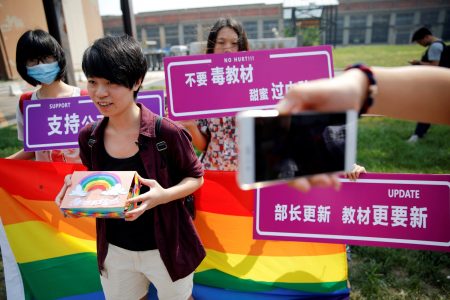Chinese Gay Rights Activist Qui Bai Sues Ministry of Education - Dispatch Weekly
September 15, 2016 - Reading time: 6 minutes

Qiu Bai, a Chinese student activist lodged a suit against the Ministry of Education over school textbooks describing homosexuality as a “mental disorder” which is a small step for the gay rights movement in China.
Not Illegal to be Gay But Strong Family Pressure to be Heterosexual
Although it is not illegal to be gay in China, there is still strong family pressure to get married and have children.
Getting married and having children is central to the Chinese culture, which is based on a Confucian ideology
Under the Feudal system, from the Qin (221 BC-206 BC) to the Qing Dynasties (1644-1911), the importance of getting married was vital to the future success of both a man and woman.
Under a feudal society, the parents and not the individuals decided whom to marry. Therefore it is not uncommon, for family to pressurize young people to get married and have children in their early twenties, as this is part of a traditional rite of passage in China.
Strong Online Gay Community in China
According to estimates there are more than 65 million LGBTQ (Lesbian, Gay, Bisexual, Trans and Queer) individuals living in China. Despite the lack of coverage, the online community is said to be thriving.
In a Quartz article, one such Chinese gay individual noted that in spite of China’s digital censorship laws, LGBTQ topics were not quashed, but were growing.
Zack Bu said: “As long as this community doesn’t disrupt the government’s status quo offline through public protests and disruptive gatherings, they are rarely interfered with or discouraged by Chinese officials; in fact, they’re flourishing.”
Homosexuality Listed as a Mental Disorder
According to research by the Gay and Lesbian Campus Association of China, 2014, Homosexuality was listed as a mental disorder until 2001, with university textbooks continuing to refer to being gay as a “disorder” and “impediment.”
Qiu Bai, 21 and a media studies student at Sun Yat-Sen University in Guangzhou said that she found such books in her university library:
“Since 2001 when homosexuality was declassified as an illness in mainland China, 40 percent of the psychology and mental health teaching materials published on the mainland say homosexuality is an illness.”
Legal Action and an Ignored Issue
In 2015 Qiu Bai raised the issue and launched legal cases with the Ministry of Education and publishers of the textbooks, to which complaints and applications were ignored or rejected.

Her aim was to recall the textbooks but so far her requests have been dismissed
The Ministry of Education failed to send a lawyer and representatives did not answer questions.
Intolerance towards the Gay Community
Until the 2000s laws surrounding gay rights were vague and practically non-existent. Only in 2001 was homosexuality decriminalized and taken off as an official psychiatric illness.
However, past books still contain old ideas that Qui Bai has been trying to get off the library shelves.
In April this year, a judge dismissed a same sex marriage involving Sun Wenlin and Hu Mingliang.
Yu Hu also sued a psychiatric hospital in Henan province for “gay conversion therapy,” when it was discovered by his family that he was gay.
Chinese Censorship, Being a Troublemaker and Disappointment
The reports on the hearing have been censored, although the coverage in state media and online remain relatively sympathetic. Yet not many supporters turned up outside the court house.
Xia Xu, a student activist who works with Qiu said, “If you file a lawsuit in China, sometimes people will think you’re too aggressive-that you’re a troublemaker.”

According to CNN, the Internet Police reportedly employs 30,000 agents who investigate individuals who post information online that may be offensive to Chinese government and officials.
This kind of information includes: rumors, state secrets and material that bring down Chinese morale and its reputation.
Qiu Bai said, “As someone studying within the education system, when the Ministry of Education tells me that the education materials have no connection with us and we won’t deal with it, it’s really disappointing.”

DW Staff
David Lintott is the Editor-in-Chief, leading our team of talented freelance journalists. He specializes in covering culture, sport, and society. Originally from the decaying seaside town of Eastbourne, he attributes his insightful world-weariness to his roots in this unique setting.




